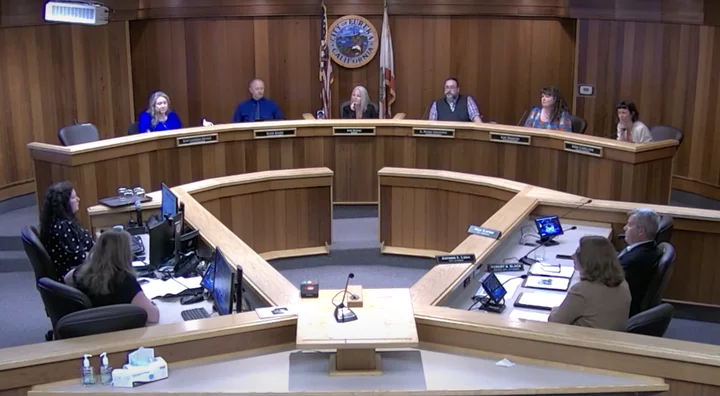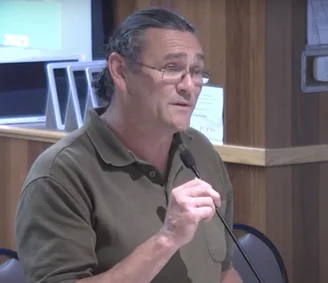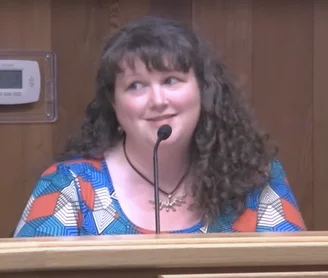Screenshot of Tuesday’s Eureka Council meeting.
###
The Eureka City Council voted Tuesday to rescind and replace its “Councilmember Handbook” to address mounting concerns from some members of the public who allege that members of the council have violated the city’s code of conduct.
The policy contained in the new “Handbook” reinforces existing rules from state and federal entities that guide ethics and conduct standards for public officials.
The issue came about earlier this year when Eureka business owner Roy Gomez filed a claim for damages against the City of Eureka. The claim, in part, accused the city council of violating the city’s “Code of Ethics and Conduct for Elected and Appointed Officials.” Gomez had claimed that Councilmember Leslie Castellano, specifically, had violated the ethics policy in various ways after she, in her capacity as the executive director of the Ink People Center for the Arts, declined to assign a special event permit to sell alcohol at a function at Gomez’s former event venue, Forever Found.
Gomez has openly discussed his claims against the city during the non-agenda public comment portion of several recent city council meetings, going so far as to accuse several members of the council of being “undemocratic anarchists” seeking to dismantle capitalism.
During Tuesday’s meeting, Assistant City Manager Pam Powell detailed the history of the city’s existing code of conduct, which was adopted in a narrow 3-2 vote by a previous council in May of 2017. The two dissenting council members questioned some of the provisions included in the code, and one of the council members refused to sign the document entirely. Former Eureka Mayor Frank Jager signed the document but rescinded his signature in 2018. “Once the mayor rescinded his signature, staff was kind of in a predicament over how we could enforce this document,” she said.
“The main issue with the document were First Amendment concerns,” Powell continued. “The document did not allow for the mayor, councilmembers, or board and commission members to use their title when endorsing a political candidate. Staff’s concerns centered on the enforceability of the document.”
Powell added that the document included provisions that gave the mayor “more power than the charter actually allows.” In fact, staff reported, the policies in the Handbook were never adopted into the city charter or its ordinances — they merely served as a voluntary set of guidelines that previous councilmembers could follow or not.
The code of conduct was not provided to new council members following the November 2018 election. However, staff worked with the former city attorney and city manager to ensure that the mayor and council followed rules outlined by California’s Fair Political Practices Commission (FPPC) and Assembly Bill 1234, which required elected officials to take an ethics course every two years.
Powell noted that “many elements” of the 2017 code of conduct document are included in the new handbook, including concepts of respect, staff relationships, rules, conflict of interest and ethics. “The new handbook does not contain any provisions regarding council members and their use of titles should they support a political candidate,” she said. “Staff believes that the council handbook confirms the city’s commitment to strong ethics and transparency.”
Councilmember Kati Moulton asked what is covered in the city’s handbook that isn’t already required by the FPPC or other existing laws surrounding ethics and conflict of interest.
“I would agree with [Powell] that the things that are in the old code that aren’t in this new handbook are what we would consider somewhat problematic portions around whether or not city council members can use their title in supporting other candidates,” City Attorney Autumn Luna responded. “We didn’t think it was appropriate for the new code.”
Even so, Councilmember Renee Contreras-DeLoach asked if the city had an obligation to enforce the rules outlined in the document. Luna said she would not feel comfortable enforcing “questionable regulations against the council,” adding that the document “doesn’t have the force of law.”
“Let’s just remember that, hierarchically, we have really important and complex laws coming from the state and coming from the FPPC,” Luna continued. “I don’t mean to drive this home too many times, but you are not setting conflict of interest rules for yourself and then rescinding them. Those rules are set elsewhere in the law, and you follow them because of that. Not because of a resolution [that was] passed by a different counsel at a different time.”
During the public comment portion of the discussion, Gomez criticized the city’s decision to ignore its own code of ethics. He asserted that the proposed handbook has “no actual teeth to it” and urged the council to amend the existing document.
“The one being rescinded … there’s accountability within it,” he said. “It’s important that we realize that the violations have been occurring because there’s been no code of ethics. You can’t just say, ‘Oh, I submitted a Form 700 and we’re good.’ Like, there are ongoing conflicts of interest on a daily basis. … To be honest with you, I actually agree that the council members should be okay with endorsing [candidates]. Why not just rescind that piece out of it and then leave it as it is? It’s a good document as it is.”
(Note: Form 700 is a document used by public officials to disclose financial interests to ensure the public is aware of a public official’s financial interests and remind the public official of potential conflicts, according to the FPPC.)
Eureka resident Ash Teeter questioned the timing of the code of conduct update accused the city council of “changing the rules of the game that [it] might already be cheating in” and echoed Gomez’s previous claims that the council is a group of anarchists.
“Multiple city council members … support dismantling capitalism, anarchy and are affiliated with extremist groups like Antifa on their Twitter pages, as I found,” Teeter said. “It’s like they’re playing both sides of the game … sitting on the council chambers by day, plotting the downfall of the system by night.”
Arcata resident Jessica Frint said she did not intend to speak during public comment but felt compelled to after she heard Moulton swear under her breath during Teeter’s comments.
“When [he] asked her a question, she replied, ‘You asshole,’” Frint said. “If we have a code of conduct, I would assume that’s a violation. I would like to see you do something about it. … Or whoever is responsible for doing something about it, do something about it. That’s bad behavior.”
Following public comment, Moulton began to apologize for her “outburst” but was met with shouting from Gomez in the audience. Mayor Bergel interjected and requested that the council take a five-minute break.
Upon the council’s return, Contreras-DeLoach said she watched the May 2, 2017 city council meeting to better understand the history of the city’s code of conduct policy before voting on the matter. “And I feel very comfortable saying that I think the document is a redundant document,” she said.
“These are laws that already exist,” she continued. “These are things that we’re already held to, trainings we’ve already done, they’re things that we’ve already signed or stuff that we have to declare. … I don’t have any concerns moving forward with this.”
Contreras-DeLoach also acknowledged the public’s concerns surrounding the timing of the item.
“I acknowledge that doesn’t look great … [but] I think this is one of those things where, unfortunately, sometimes the veneer of something just gives you the wrong impression,” she said. “If someone doesn’t take the time to listen to what we’re saying or to look at these documents or to watch that council meeting, they may walk away from this thinking … we want to disband or abolish some code of ethics when in reality we’re held by much bigger laws.”
Contreras-DeLoach made a motion to approve staff’s recommendation to replace the ethics handbook with the new proposed document. Moulton offered a second to the action, as well as an apology.
“Thank you, Councilmember Contreras DeLoach for articulating what I was too heated to say,” Moulton said. “I want to apologize again to the mayor, Mr. Teeter and to the public for losing my cool and lowering the discourse when we should be elevating the discourse with information and with perspective.”
Before taking a vote, Councilmember Leslie Castellano noted that it isn’t out of the ordinary for the city council to repeal and replace documents.
“This is a fairly normal and natural part of city government,” she said. “You know, as we learn and grow as a populace we repeal and replace things and that’s healthy democracy. … I personally think that there are many reasons that problematic documents are changed … Often those are brought to our attention by citizens in various ways. This is also one of those instances where a citizen brought forward something that was problematic and we have an opportunity to change it.”
Councilmember G. Mario Fernandez echoed Castellano’s comments and said he felt comfortable moving ahead with the new document.
Councilmember Scott Bauer took a moment to dispute previous accusations that members of the council have anarchist affiliations, noting that the council had passed a budget earlier in the evening “that fully funds our police force and our firefighters.”
The motion passed in a unanimous 5-0 vote.
###
Other notable bits from Tuesday’s meeting:
- The city council unanimously approved the proposed budget for fiscal year 2023-24. Eureka’s Finance Director Lane Millar pointed out a few minor modifications to the proposed budget during a presentation to the council, including a request to transfer $9,000 in non-departmental funds to the mayor and council’s division for future town halls. Millar also discussed several potential investment opportunities through the state and federal governments which will be further discussed at a date uncertain.
- The city council approved a 10.44 percent rate increase for trash collection in Eureka in a 4-1 vote, with Fernandez dissenting.
- The council gave Public Works Director Brian Gerving the green light to accept a $5 million grant on behalf of the City of Eureka for a restoration project to enhance fish passage in a stream between Myrtle Avenue and Fourteenth Street. The item passed in a unanimous 4-0, with Bauer recusing himself.



CLICK TO MANAGE